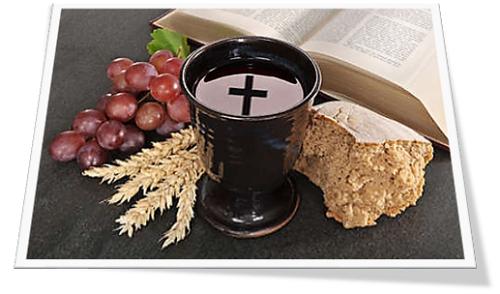Communion Everybody is doing it ... But what exactly is it that we’re doing?
Communion Everybody is doing it ... But what exactly is it that we’re doing?

There are different kinds of communions and communities. Recently, many people refrained from voting in the European elections because the European Community holds no appeal for them. Around 60 % said “go ahead without me”. In the Bible, communion is something very different.
Communion as intended by God encompasses your whole existence. It is a characteristic of communion with Him that you preserve your own identity while your life is included within the greater ‘whole’. You no longer think in the ‘I’ mode but from within the ‘we’.
Learning from God⤒🔗
An important feature is that your own identity is not expunged. You cannot give yourself if you are not yourself. You must therefore take care that you do not dissolve into everything around you. At the same time, you stop thinking as an unconnected individual; you can even say that you no longer have independent existence. This is noticeable by all who interact with you.
Communion keeps you alert. It is not an attribute of yours, anyway, independent of thinking. It is more an activity: you choose to live that way in all that you do. This becomes very clear when we look at how God has communion – forms a union – within Himself. Father, Son and Holy Spirit are three different persons that cannot be confused. The Son suffered on the cross, not the Father. The Spirit was poured out, not the Son. At the same time, they are connected to one another in a way that is distinctly God. God is one. Whoever has the Son also has the Father and the Spirit. They do not operate independently. Just as they are one, they also work together in everything. The Father created, but He did so through His Son, all being called to life by the Spirit.
In this manner, creation was incorporated in the divine communion from the beginning. Adam was the son of God (Luke 3:38). A most distinctive aspect about man is that he is created in communion with God: his ‘I’ is created within a great ‘We’. Because this is so essential to man, we can understand why breaking that communion entails our death. Yet all who in faith come to recognize God cross over from death to life instantly (John 5:24).
All that God does on earth is directed at restoring that communion. He even names himself that way. Does He not wish to be known as the God of Abraham, the God of Isaac and the God of Jacob, to indicate that He has an eternal covenant with them and that they now live with Him? They no longer exist apart from Him, and neither does He have an independent existence. God presented himself time and again as the ‘God of Israel’, to display to the whole world how He is one with His people.
Embracing Jesus←⤒🔗
Because God is, creates, acts and saves thus, we are called upon to have communion with Him. In that way our ‘I’ can come back within the great ‘We’. This extends further, deeper and higher than anything we can imagine. Yet this is what the practice of faith is, and the quality of it. How do we do that? By ‘embracing’ our Lord Jesus Christ (Art. 22 Belgic Confession) – a profound, word to describe it. Embracing speaks of love, caring, never letting go. You cannot do it by half, or do it in passing. Jesus says that we must ‘eat and drink’ Him (John 6:53). How do you do that? In the same way that you can ‘devour’ a book: you get drawn into it, you cannot wait to read further, and when it is finished you start anew. Indeed, no one can do that on his own initiative. The longing comes from God, who works it in us. Jesus gives Himself in that way, totally. He did not merely pass by, but became one of us, He bound Himself to our lives, with our sinful and ailing existence, yes, even with our guilt. He gave Himself in an all-encompassing communion. Our life became His life. His life becomes ours.

He penetrates into our spirit through His Spirit. How much further can communion go? He is in us and we are in Him, as He is in the Father and the Father in Him (John 17:20-23). Every time we celebrate the Lord’s Supper the familiar words resound, that the bread is the communion of His body and the cup the communion of His blood. The bread makes us one with the body of Christ; the cup of wine makes us one with the blood of Christ (1 Cor 10:16). In this way we become one with Him Himself, with the unity that comes from God. We learn to truly embrace Him in faith.
Mystical?←⤒🔗
It is a fact that Reformed people can be very down-to-earth, and so I sometimes hear that they find this teaching too ‘mystical’. But mysticism is something different. It is characteristic of mysticism that the boundaries between God and man melt away. The Holy Spirit and the human spirit flow into each another. The human ‘I’ is dissolved into the ‘We’. That is not what we confess. We receive communion in faith while the boundary between God and man remains intact. He is God and we are His creation. We do not know Him of ourselves, not since paradise, but we will listen closely to His voice, His Word.
A warning against mysticism is not out of place here though, for it is all too easy for believers to go to extremes. They then keep the Bible closed because they believe they can ‘feel’ who God is and what he wants. That attitude displays little interest in better knowing God, and instead leads to serious derailment and fanaticism. Having said that, it would be pleasing if the ‘strict’ Reformed would more evidently express their joy in the Lord. Communion expresses itself in everything; one cannot exclusively be formal and business-like. The primary concern is that the Lord emerges in your life always and everywhere, (1 Cor. 1:5-9).
Mystical after all?←⤒🔗
The communion with the Lord binds believers into a ‘community.’ That word means that we have communion with each other. If you do not have that, then you may be a religious group, but you are not a community in the sense of a congregation. That is why we always read in the Scriptures that we must bring the communion with our Lord into our connections with each other. They are not two separate issues since the concern is the one great ‘we’ in the Lord. (Eph. 4:1-8, Phil. 2).
Now, this can pose difficulties for us. For though God is good, people can be so limited and behave so strangely. Sometimes they have bizarre opinions. Then you can feel the inclination to pull your ‘I’ back out of that ‘we’.
In that case, it is interesting to consider whether we are not thinking ‘mystically’ about the congregation. For we do not merely feel what moves the others; that is not the way to God nor to each other. Within the community we also need to get to know each other, taking into account that there is and always will be a difference.
I sometimes get the impression that matters are getting confused here. Some people treat God with great respect and would never dream of approaching Him based on ‘feelings,’ yet they behave entirely differently with fellow believers. They scrutinize and judge them based on their own feelings (for style, music, tradition etc.) and are quick to say disrespectful things about them. It shouldn’t be like that, however. Within the great ‘we’ everyone keeps his own ‘I’ that God gave him, and must not become indistinct – quite the opposite! You can never use yourself as a measuring rod for someone else. What must we do then? Get to know one another in the Lord! Our communion with one another is in Him and no other way. Not by feelings, not by looks, not by all sorts of characteristics of race, blood and country, but only in the Lord. It is therefore important that we take the trouble to get to know one another in such a way that we recognize the Lord in each other. That is exactly the way in which we as churches try to seek unity with the Nederlands Gereformeerde Kerken and the Christelijke Gereformeerde Kerken: we wish to discover how the Lord is present there, and they wish to discover the same in us. In His light we find each other (1 John 1:7), and in this light their and our many peculiarities fade away and become completely subordinate.

John says it in a penetrating and revealing way: ‘If anyone says, “I love God,” yet hates his brother, he is a liar!’ (1John 4:20). Yes indeed, a liar! Such a person does not love God, because he refuses to see and accept Him as He, through His Spirit, dwells in the heart of that brother or sister. In no other way could all emotional obstacles and all excuses to pull out of the community be placed under sharper scrutiny. The Lord demands faith, including in communal relations.
Exclusive←⤒🔗
Communion also excludes. If you get married, you are embarking on a unique life-union with that one person. That says something about your attitude toward all the others. You do not have such (comm)union with them, else something would be fundamentally wrong.
It is this way with the Lord too. He warns us not to seek communion with demons. Why not? Because we have communion with Him. There can be no combination. Imagine, by doing so we would draw Him into communion with those that hate Him! God will not stand for that: He is holy and formidable (1 Cor. 10:21-22).
Because we have communion with Jesus Christ, we may not seek communion with someone who denies him (2 Cor. 6:14-18). This is such an important issue when choosing a partner. You may choose whomever you wish, on one condition: that you choose someone with whom you are one in the Lord (cf. 1 Cor. 7:39).
Not that this only applies to marriages. Beware of close relations and friendships in a life in which God has no place. That does not mean fleeing from society, for you are the salt of the earth. Just keep your Spirit free for the Lord alone and the Lord wholly.

Add new comment